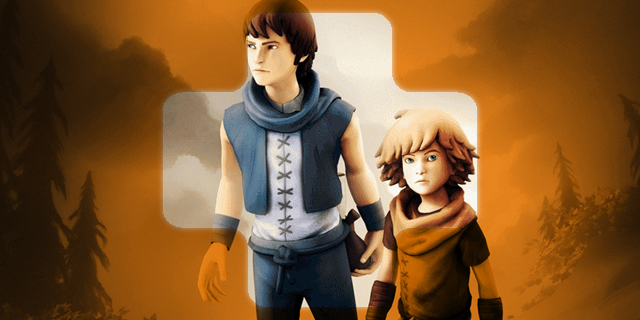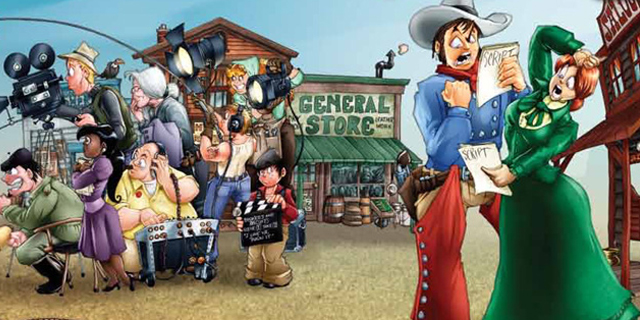
This column contains full story spoilers for Brothers, so if you haven’t had a chance to play it yet, don’t read on. Also, go play it. You’ll thank me later.
Last time, I discussed fundamental game mechanics that help certain games stand out when they might not otherwise. Gunpoint was the prime example, with its excellent jumping mechanic laying the groundwork for the rest of the game’s brilliant design. Sometimes, however, this singular mechanic can not only help a game stand out, but make its story more impactful as a result.
READ MORE

You can play Deadwood Studios, USA (originally Deadwood in its 1999 incarnation but changed in its most recent printing for a couple of reasons) for free right now by going to the Cheapass Games site and downloading the print and play edition. Or, for $40, you can get the new prettied-up (and rules-revised) Kickstarted edition and take it easy on your printer.
Your move, pardner. READ MORE

Genre 101 is a series that looks at the past and present of a game genre to find lessons about what defines it. This week, Shawn guides us through what may be the oldest genre of them all.
The first serve
 Shawn Vermette: Everyone has heard of Pong; it might be the most ubiquitous video game in existence. But it wasn’t the first sports game. Tennis for Two, which was made way back in 1958, holds that honor. In fact, Tennis for Two was arguably the first video game ever. It’s a fitting distinction, given that sports lend themselves so well to the video game medium. Using an oscilloscope, since monitors didn’t even exist back then, two people could hit a ball back and forth over a net using basic analog controllers. That was basically it, but it was over 20 years before anyone was able to surpass it in complexity. READ MORE
Shawn Vermette: Everyone has heard of Pong; it might be the most ubiquitous video game in existence. But it wasn’t the first sports game. Tennis for Two, which was made way back in 1958, holds that honor. In fact, Tennis for Two was arguably the first video game ever. It’s a fitting distinction, given that sports lend themselves so well to the video game medium. Using an oscilloscope, since monitors didn’t even exist back then, two people could hit a ball back and forth over a net using basic analog controllers. That was basically it, but it was over 20 years before anyone was able to surpass it in complexity. READ MORE

The just-announced Puyo Puyo Tetris may seem like a bizarre anomaly to some in the West. Even to those who’ve played one of the localized Puyo games, it still seems weird that it could share top billing with the king of the puzzle genre.
In Japan, it’s… still weird, but considerably less so. READ MORE

Most games have a clear set of goals in mind for the user to experience. This usually involves completing the game’s main campaign; starting a new game, going through levels and defeating the end boss. Roll the credits. You can now discuss what you thought of the ending with fellow players, or start a discussion on the game’s themes without feeling left in the dark.
Some of the more interesting experiences come from when players go off the beaten path. They ignore the checklist given to them by the developers. Maybe they go for every achievement, or try to play with a heavy handicap, or try something nobody in the world has yet. It is this dedication to mastery that I find so fascinating. To apply time, practice and discipline necessary to master a game means there’s a deeper connection and a more personal attachment. Why does this happen? READ MORE






 Shawn Vermette: Everyone has heard of Pong; it might be the most ubiquitous video game in existence. But it wasn’t the first sports game. Tennis for Two, which was made way back in 1958, holds that honor. In fact, Tennis for Two was arguably the first video game ever. It’s a fitting distinction, given that sports lend themselves so well to the video game medium. Using an oscilloscope, since monitors didn’t even exist back then, two people could hit a ball back and forth over a net using basic analog controllers. That was basically it, but it was over 20 years before anyone was able to surpass it in complexity.
Shawn Vermette: Everyone has heard of Pong; it might be the most ubiquitous video game in existence. But it wasn’t the first sports game. Tennis for Two, which was made way back in 1958, holds that honor. In fact, Tennis for Two was arguably the first video game ever. It’s a fitting distinction, given that sports lend themselves so well to the video game medium. Using an oscilloscope, since monitors didn’t even exist back then, two people could hit a ball back and forth over a net using basic analog controllers. That was basically it, but it was over 20 years before anyone was able to surpass it in complexity. 

















